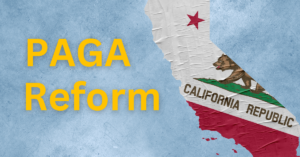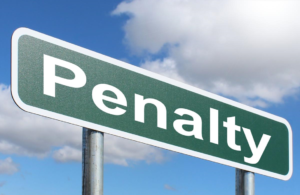 As anticipated, Governor Gavin Newsom has signed legislation to reform the Private Attorneys General Act (PAGA), following a multi-party effort between business and labor groups. As a result of this new legislation, the FIX PAGA November ballot initiative has been withdrawn.
As anticipated, Governor Gavin Newsom has signed legislation to reform the Private Attorneys General Act (PAGA), following a multi-party effort between business and labor groups. As a result of this new legislation, the FIX PAGA November ballot initiative has been withdrawn.
In signing AB 2288 and SB 92 Governor Newsom stated: “This reform is decades in the making — and it’s a big win for both workers and businesses. It streamlines the current system, improves worker protections, and makes it easier for businesses to operate.” The legislation is also intended to promote employer compliance, streamline litigation processes, and avoid a contentious ballot measure.
The amendments to PAGA will be applied to litigation brought on or about June 19, 2024 – unless the Plaintiff filed their PAGA notice with the LWDA prior to that date. Other aspects of the legislation will become operative as of October 1, 2024.
The core elements of the reform package are:
Definition of an “Aggrieved Employee” & Plaintiff’s Standing
- A PAGA plaintiff must be personally “aggrieved” – meaning the employee must have personally experienced the alleged Labor Code violations they are seeking to pursue on a representative basis in order to have standing to bring the lawsuit.
- The alleged violations must have occurred within one year of the filing of the PAGA notice with the LWDA for the Plaintiff/employee to have standing to bring the claim (presently, there is no time limitation).
New Penalty Structure
- No Penalty: An employer who (1) cures an alleged violation and (2) takes “all reasonable steps to be prospectively in compliance” either before or within 60 days of receiving a LWDA notice of a claimed PAGA violation will not be liable for any penalty.
- Cap On Penalty If Cure Prior to Notice: Penalties will be capped at 15% of the applicable penalty for employers who have shown that they have taken all “reasonable steps” to be in compliance” with the law prior to receiving a PAGA notice or a request for personnel records.
- Cap On Penalty If Cure Within 60 days Of Notice: Penalties will be capped at 30% of the applicable penalty amount if, within 60 days after receiving a PAGA notice, an employer “has taken all reasonable steps to prospectively be in compliance with all provisions identified in the notice.”
- Reduced Penalties If Weekly Pay Period: Penalties will be reduced by 50% if anemployer’s regular pay period is weekly rather than biweekly or semimonthly. This equalizes the potential penalties for employers who pay employees on a weekly basis as opposed to every two weeks or twice a month.
- Cap On Penalties: Penalties will be capped at $15 per employee per pay period if an employer cures the alleged violations but does not take “all reasonable steps to prospectively be in compliance” with the law.
- Wage Statement Penalties Capped: Penalties for wage statement violations under Labor Code Section 226 that do not cause injury will be capped at $25 per employee per pay period. (Note: there is no cap on penalties for a failure to provide wage statements.)
- Penalties for Errors Capped: The maximum penalty will be capped at $50.00 where the alleged violation was an isolated error that does not extend beyond the lesser of 30 days or 4 consecutive pay periods, or where there is a wage statement violation that did not cause confusion or economic harm to the employee (i.e. misspelling of company name or forgetting to add “Inc.” on the pay statement).
- Increased Penalty Amount Not Automatic: PAGA’s heightened penalty of $200 will be assessed only after (1) a court or agency “has issued a finding or determination to the employer that its policy or practice giving rise to the violation was unlawful” within the five years preceding the allegation violation, or (2) the court determines an employer acted maliciously, fraudulently, or oppressively.
- Allocation of Penalty Recovered Changes: The share of penalties allocated to the LWDA will decrease from 75% to 65% and the amount to the employee increases from 25% to 35%.
The legislation defines “all reasonable steps” to include, but are not limited to the following actions:
- Conducting an audit of wage and hour violations and actionable steps taken by the employer in response to the results of the audit.
- Distributing lawful written policies to employees.
- Conducting training for supervisors on applicable labor code and wage order compliance.
- Undertake appropriate corrective action with regard to supervisors who violate the labor code.
Whether or not the employer took reasonable steps will be a decision left to the discretion of the court, which can take into account factors such as the size and resources available to the employer, and the nature, severity, and duration of the alleged violations.
Employer Right to Cure
- Expands which Labor Code sections can be cured, so employees are made whole quickly.
- Employers fewer than 100 employees during the PAGA period may, within 33 days of receipt of an employee’s PAGA notice, submit to the LWDA a confidential proposal to cure one or more of the alleged violations. If the LWDA determines that the employer’s proposal is not sufficient or does not act upon the employer’s cure proposal, the employee may proceed with filing a PAGA action in court.
- Employers with 100 or more employees, during the applicable PAGA period, may request a stay of all court deadlines and seek an early evaluation conference to work on a plan to cure the alleged violations and if no agreement is reached by the parties, the employer may seek court approval.
Judicial Discretion (Manageability)
Trial courts will have the power to limit both the scope of PAGA claims and the evidence presented at trial to ensure the claims can be effectively and manageably tried.
Injunctive Relief
For the first time, Plaintiff’s will be allowed to seek injunctive relief.
Strengthening Enforcement Agency
The Administration will pursue a trailer bill to give the California Department of Industrial Relations (DIR) the ability to expedite hiring and filling vacancies to improve and expedite enforcement of employee labor claims.
What This Means For Businesses
The PAGA reform legislation should curtail the ongoing surge of PAGA cases being filed for what, in some instances, amounts to insignificant errors and violations, but substantial penalties. Specifically, it is expected that:
- When litigation is filed, courts will have greater authority to manage the extensive discovery that has been so burdensome for businesses.
- Employees, who proactively work to resolve (“cure”) the violations should be able to reduce or eliminate the potential for excessive penalties.
Unfortunately it does not appear that these reform measures will have any impact on pending PAGA litigation or where the LWDA notice was given prior to June 19, 2024.
Overall, the passage of AB2288 and SB92 are a positive for business in California.
AB 2288 can be found here.
SB 92 can be found here.
This Newsletter is intended as a brief summary of employment law. While every effort has been made to ensure the accuracy of the information contained herein, it is not intended to serve as “legal advice,” or to establish an attorney-client relationship. If additional information is needed on any of the topics contained herein, please contact our office. All rights reserved. ©2024.
